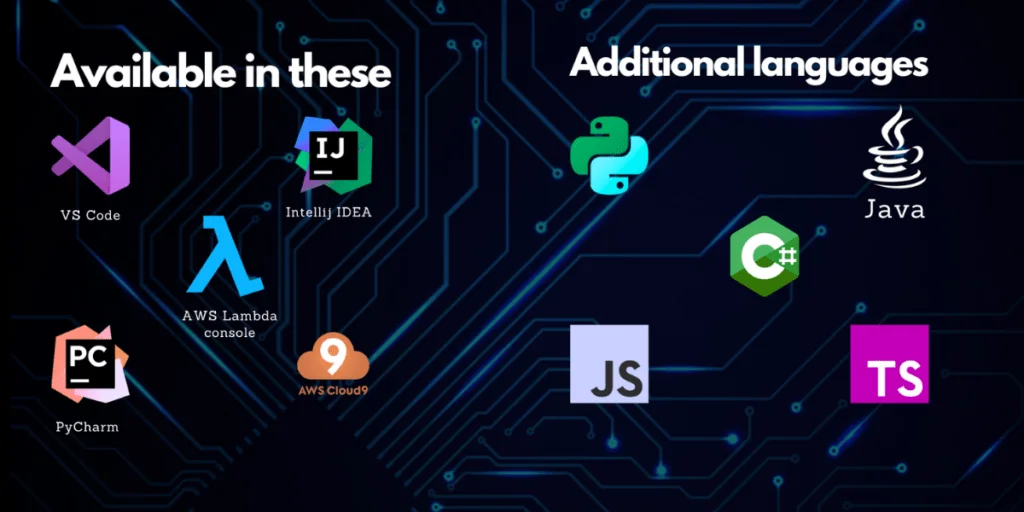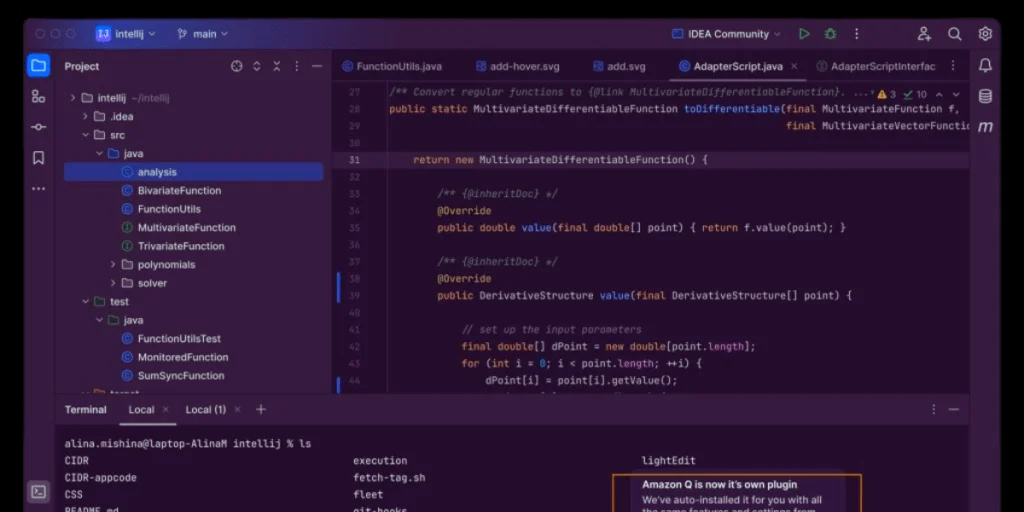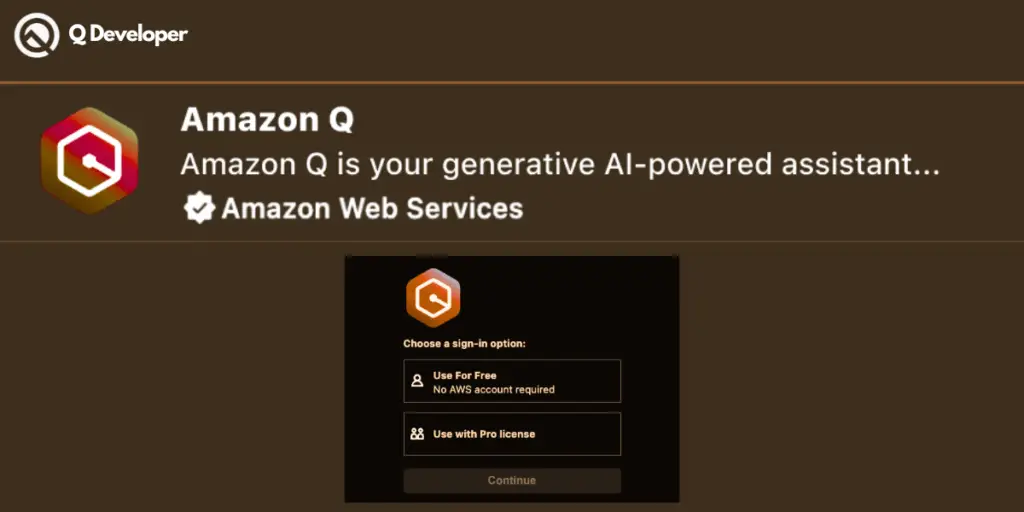Amazon is rebranding its AI-powered coding assistant, Amazon CodeWhisperer to Q Developer. This change marks a strategic pivot towards a more integrated and expansive suite of tools to enhance productivity in the tech industry.
The rebranding introduces Q Developer as a part of Amazon’s broader Q family, including the newly announced Q Business.
This transition reflects Amazon’s response to the competitive pressures from similar tools like GitHub Copilot. It addresses the broader needs of developers by offering enhanced functionalities beyond simple code suggestions.
Amazon CodeWhisperer to Q Developer
Launched initially as CodeWhisperer, the tool aimed to assist developers by providing coding suggestions, debugging, and other supportive tasks.
Despite its capabilities, CodeWhisperer struggled to gain traction and compete with GitHub’s Copilot, which boasts over 1.8 million paying users.
In an insightful interview with TechCrunch, Doug Seven, GM and director of AI developer experiences at AWS, shed light on the rebranding decision.
According to Seven, CodeWhisperer was perceived as a “branding fail,” prompting the need for a name and identity encompassing a broader set of functionalities and appeal.
This introspection led to the birth of Q Developer. This platform retains the core features of CodeWhisperer. It introduces new capabilities that address a more comprehensive range of development activities.
Q Developer distinguishes itself by not just focusing on individual coding tasks but also embracing a more holistic approach to project management.

It supports SQL code generation, which is vital for database management and operations. It enhances the scope of automated tasks like code testing, implementing new code, and refactoring.
This expansion reflects a clear intention to make Q Developer an indispensable part of the developer’s toolkit, capable of handling complex and varied programming needs.
The rebranding to Q Developer aligns with the launch of other products under the Q brand, like Q Business, signalling Amazon’s commitment to integrating AI across different business functions.
Enhanced Features of Q Developer
One of the standout additions in Q Developer is the introduction of the “Agents” feature, which autonomously performs tasks such as feature implementation, code documentation, and refactoring.
These Agents can analyze existing codebases, generate new code, create detailed implementation plans, and execute these plans after developer review.
This capability significantly reduces the time and effort required for routine coding tasks, allowing developers to focus on more complex and creative aspects of their projects.
Q Developer is equipped to generate code in various programming languages, including SQL, which is essential for database management and manipulation.
Beyond generation, Q Developer also offers robust testing features, ensuring that newly generated code not only integrates smoothly but is also error-free and efficient. Also, Q Developer has improved its integration capabilities with existing developer environments and tools.
It can be used directly within popular IDEs such as Visual Studio Code, JetBrains, and more, providing seamless interaction within the tools developers already use.
Q Developer is set to introduce new functionalities that will further enhance its appeal to developers. The upcoming features include support for .NET conversions, indicating Amazon’s commitment to supporting a diverse array of programming ecosystems and reflecting the latest in technology trends.
Comparative Analysis
As AI-powered coding assistants become increasingly integral to software development, Amazon’s Q Developer and GitHub’s Copilot have emerged as leading tools.
Both platforms offer advanced features that aim to streamline coding tasks, but they approach developer assistance in slightly different ways.
Both Q Developer and GitHub Copilot offer code suggestion features. Still, Q Developer extends its capabilities by adding its Agents feature, which autonomously handles tasks like implementing new features, documenting, and refactoring code.
This allows for more comprehensive automation of development processes compared to GitHub Copilot, which primarily focuses on providing real-time code suggestions based on the context of the code being written.
Q Developer’s Agents can autonomously create development plans, including code generation, testing, and integration, effectively taking a project from an initial idea to ready-to-deploy code.

GitHub Copilot acts more as a copilot, assisting developers by suggesting code snippets and completions but requiring more manual oversight and integration by the developer.
Both tools integrate with popular development environments and IDEs, enhancing their usability.
Q Developer also provides specific functionalities tailored to managing AWS cloud infrastructures, making it particularly valuable for developers working within the Amazon ecosystem.
GitHub Copilot, while versatile, does not offer cloud-specific management tools, focusing more broadly on code generation across various programming languages.
Recent studies and security research have highlighted potential issues with AI-powered coding tools, including the risk of introducing bugs and security vulnerabilities.
Both Q Developer and GitHub Copilot are trained on vast datasets of existing code, which can sometimes perpetuate existing errors or insecure coding practices. The impact of these issues may differ based on how each tool is implemented and used within development workflows.
Integration with AWS
It provides developers with seamless access to cloud resources and management tools directly within their coding environment.
Q Developer is deeply integrated with AWS services, enabling developers to manage and interact with AWS resources without leaving their development environment.
This feature is handy for businesses that rely heavily on AWS for their infrastructure needs, as it simplifies workflows and enhances productivity by reducing the need to switch between tools and platforms.
One of the critical features of Q Developer is its ability to handle AWS-specific queries and tasks. Developers can use Q Developer to list all active AWS Lambda functions, query resources across different AWS regions, and even generate AWS Command Line Interface commands.
These capabilities are crucial for efficient cloud resource management and ensure that developers have quick and easy access to the information they need to make informed decisions about their cloud infrastructure.
While Q Developer can generate AWS CLI commands, it notably does not execute them automatically.
This cautious approach allows developers to review the commands for accuracy and security before running them, aligning with best practices for cloud security and compliance.
This feature ensures that operations affecting cloud configurations are executed deliberately and with oversight, minimizing the risk of unintended changes or security breaches.
Pricing and Accessibility
Q Developer is available in free and premium versions, each designed to suit different user requirements. The free version offers basic functionalities and is accessible directly through the AWS Console, Slack, and popular IDEs such as Visual Studio Code, GitLab Duo, and JetBrains.
This version is particularly appealing for individual developers sm, all teams starting out, or those still evaluating the tool’s fit for their projects.
The premium version, Q Developer Pro, is priced at $19 per month per user. It includes higher usage limits and advanced features such as tools for managing users and policies, single sign-on capabilities, and, importantly, IP indemnity.
This version is tailored for professional environments where extensive use of the tool and additional security and management features are required.

The free version of Q Developer imposes certain limitations, including monthly caps on the number of Agents’ tasks and queries about AWS account resources.
It also opts users into a data collection scheme by default, which may concern those sensitive about privacy and data usage. These limitations are likely designed to encourage users to upgrade to the premium version for more extensive use and greater control over their data.
Q Developer’s accessibility across various platforms and IDEs ensures that it integrates seamlessly into the developer’s existing workflow.
Intellectual Property Concerns
Integrating AI into coding practices has not only transformed software development. Still, it has also raised significant intellectual property concerns. These concerns are particularly relevant for AI tools like Q Developer, which generate code that could infringe on existing copyrights.
AI coding assistants, including Q Developer, are trained on vast datasets that include code from numerous sources, some of which may be copyrighted or under restrictive licenses.
This has led to debates over whether the output from such AI tools constitutes fair use or if it infringes on the original copyrights of the code snippets it was trained on.
These concerns are not hypothetical; similar tools have faced legal challenges that question the legitimacy of using copyrighted code without explicit permission.
Recognizing these concerns, Amazon has taken steps to protect users of Q Developer Pro. The premium version offers IP indemnity. Amazon will defend users against claims that the service infringes on third-party IP rights.
This protection is contingent on users allowing AWS to control the defense and settle claims as AWS deems appropriate, which can reassure businesses wary of potential legal issues.
The legal protections offered by Q Developer Pro highlight the complexities of using AI tools in software development.
While these protections provide a safety net, developers and companies must remain vigilant about using AI-generated code, especially in commercial products.
The indemnity does not eliminate the risk of litigation but provides a framework for addressing it should it arise.
The IP issues surrounding AI coding assistants like Q Developer are part of a more extensive discussion about AI and copyright law, which is still evolving.
The outcomes of ongoing and future legal cases will likely shape how AI tools are developed and used, influencing industry standards and practices.
Final Thoughts
Amazon has not only addressed the limitations of its predecessor but has also set a new benchmark for what such tools can accomplish.
With Q Developer, Amazon aims to provide a more integrated, feature-rich platform that supports a broader spectrum of coding and cloud management tasks, making it an indispensable asset for developers.
Q Developer’s robust capabilities, from generating and testing code across multiple languages to managing AWS resources, reflect a significant leap forward in making AI an integral part of the software development process.
Its ability to autonomously handle complex coding tasks allows developers to focus on more strategic work, potentially boosting productivity and innovation within development teams.
Adopting AI coding assistants like Q Developer also brings challenges, particularly regarding security and intellectual property rights.
As technology continues to evolve, so will the legal and ethical considerations accompanying its use.
Amazon’s proactive approach in offering IP indemnity with Q Developer Pro is a testament to the complexities of integrating AI tools into the software development lifecycle.


